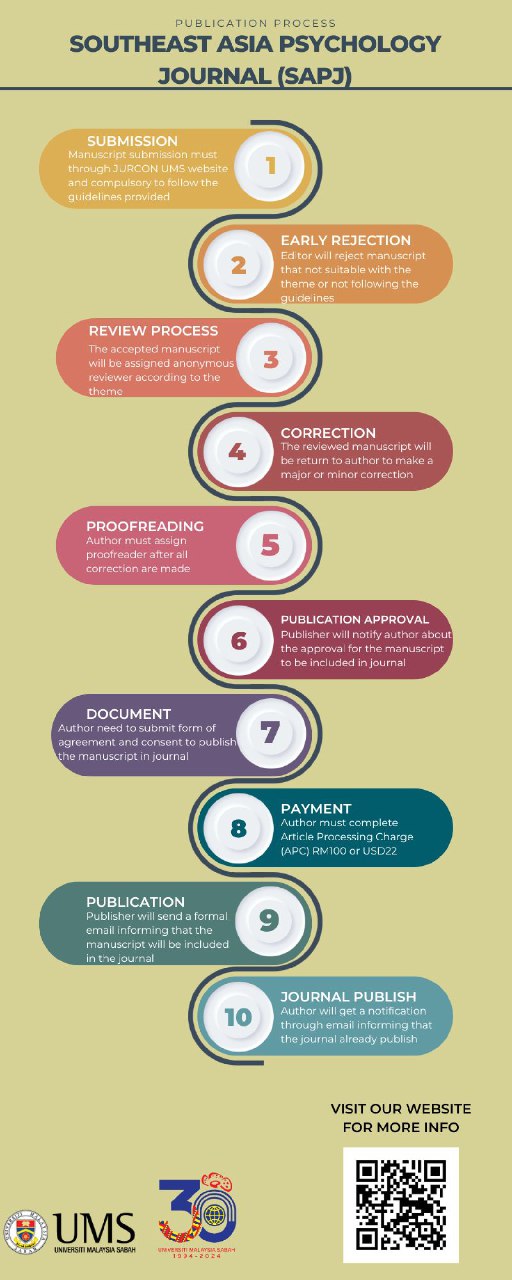THE ROLE OF PSYCHOLOGICAL WELL-BEING TO REDUCE DEATH ANXIETY DURING THE COVID-19 PANDEMIC
DOI:
https://doi.org/10.51200/sapj.v10i2.4937Keywords:
Anxiety, Covid-19, Death Anxiety, Psychological Well-BeingAbstract
The COVID-19 pandemic that has occurred over the past two years has caused increased public anxiety, especially anxiety about death. This study aims to determine the role of psychological well-being on death anxiety during the covid-19 pandemic in Indonesia. This study uses accidental sampling with 301 respondents aged 13-60 years. Instruments of this study used PWBS (Psychological Well-Being Scale) by Ryff and DAS (death anxiety scale) by Templer. Data analysis used correlation test spearment. The result show there is a relationship between psychological well-being and death anxiety r = -.142 (p = .014, p < 0.5), greater Psychological well-being the lower the level of anxiety experienced. This research is expected to contribute to reducing death anxiety of COVID -19 by increasing psychological well-being. Future research is expected to find specific variables that can reduce death anxiety and treatments that can be increase psychological well-being for society.
References
Abqori, K. Z., & Risnawati, E. (2018). Pengaruh Attachment dengan Orangtua terhadap Psychological Well Being pada Mahasiswa Tingkat Akhir di Universitas Mercu Buana Menteng. 2(2), 43–58.
Aghababaei, N., Sohrabi, F., Eskandari, H., Borjali, A., Farrokhi, N., & Chen, Z. J. (2016). Predicting subjective well-being by religious and scientific attitudes with hope, purpose in life, and death anxiety as mediators. Personality and Individual Differences, 90, 93–98. https://doi.org/10.1016/j.paid.2015.10.046
Alvarado, K. A., Templer, D. I., Bresler, C., & Thomas‐Dobson, S. (1995). The relationship of religious variables to death depression and death anxiety. Journal of Clinical Psychology, 51(2), 202–204. https://doi.org/10.1002/1097-4679(199503)51:2<202::AID-JCLP2270510209>3.0.CO;2-M
Clark, L. A., & Watson, D. (1991). Tripartite model of anxiety and depression psychometric evidence. Journal of Abnormal Psychology, 100(3), 316–336.
Kohli, S., Timelin, B., Fabius, V., & Veranen, S. M. (2020). How COVID-19 is changing consumer behavior – now and forever. McKinsey & Company, 1–6.
Laila Meiliyandrie Indah Wardani, Minak Cenggara Ramadhani Depati, Agnis Sombuling, & Erna Risnawati. (2022). Active Coping Style and Pharmacist ’ s Burnout during Pandemic COVID-19 : Core Self-Evaluation as a Mediator. 6(3), 1283–1296.
Nazira, Yurliani Elvi Andriani, Nazriani Rahma, & Yusuf, D. (2020). Correlation between mindfulness and death anxiety among the elderly: Hubungan antara mindfulness dengan kecemasan terhadap kematian pada lanjut usia. Psikologia: Jurnal Pemikiran Dan Penelitian Psikologi, 15, 55–61. https://talenta.usu.ac.id/jppp/article/view/4705/3569
Nurmaria, H., & Risnawati, E. (2022). The Relationship of Loneliness and Internet Addiction To Psychological Well-Being in Adolescents. Biopsikososial: Jurnal Ilmiah Psikologi Fakultas Psikologi Universitas Mercubuana Jakarta, 5(2), 509. https://doi.org/10.22441/biopsikososial.v5i2.14644
Risnawati, E., Oktaviani, N. P., Rosmalasari, E., & Buana, U. M. (2022). LOVE YOUR BODY ! THE ROLE OF BODY SATISFACTION IN YOUTH. 10(1), 43–56.
Risnawati Erna, & Arisandi Alfida, D. R. (2019). Peran Religiusitas dan Psychological Well-Being terhadap Resiliensi Korban KDRT. Journal.Univpancasila.Ac.Id, 10(2), 67–77. http://journal.univpancasila.ac.id/index.php/mindset/article/view/836
Ryff, C. D. (1989). Happiness is everything, or is it? Explorations on the meaning of psychological well-being. Journal of Personality and Social Psychology, 57(6), 1069–1081. https://doi.org/10.1037/0022-3514.57.6.1069
Ryff, C. D., & Keyes, C. L. M. (1995). The Structure of Psychological Well-Being Revisited. Journal of Personality and Social Psychology, 69(4), 719–727. https://doi.org/10.1037/0022-3514.69.4.719
Shukla, P., & Rishi, P. (2014). A Corelational Study of Psychosocial & Spiritual Well Being and Death Anxiety among Advanced Stage Cancer Patients. American Journal of Applied Psychology, 2(3), 59–65. https://doi.org/10.12691/ajap-2-3-1
Templer, D. I. (1970). The contruction and validation of a Death Anxiety Scale. The Journal of General Psychology, 82(2 d Half), 165–177. https://doi.org/10.1080/00221309.1970.9920634
Templer, D. I. (2006). CONSTRUCTION OF A DEATH ANXIETY SCALE – EXTENDED. 53(3), 209–226.
Varaee, P., Momeni, K., & & Moradi, A. (2017). The prediction of psychological well-being based on religiosity and self-compassion in the elderly. Aging Psychology, 3(1), 45–54.
Wardani, L. M. I., Jeanne, Y., Mardhiyah, M., Komarudin, A., Istiqomah, & Rozi, F. (2021). Core self-evaluation as a mediator for social support and psychological well-being: A study of indonesian migrant domestic worker candidates. Kasetsart Journal of Social Sciences, 42(3), 637–644. https://doi.org/10.34044/j.kjss.2021.42.3.27
Yang, H., Zhang, J., Lu, Y., & Li, M. (2016). A Chinese version of a Likert-type death anxiety scale for colorectal cancer patients. International Journal of Nursing Sciences, 3(4), 337–341. https://doi.org/10.1016/j.ijnss.2016.11.002
Yousefi Afrashteh, M., & Masoumi, S. (2021). Psychological well-being and death anxiety among breast cancer survivors during the Covid-19 pandemic: the mediating role of self-compassion. BMC Women’s Health, 21(1), 1–8. https://doi.org/10.1186/s12905-021-01533-9








